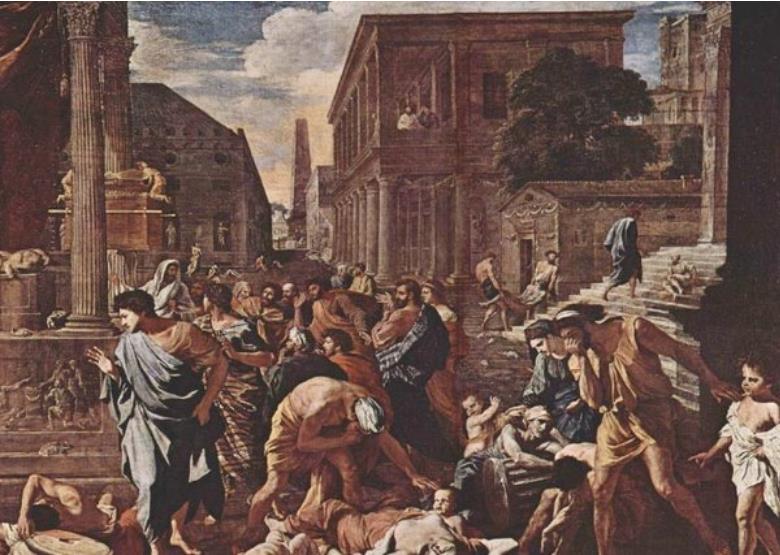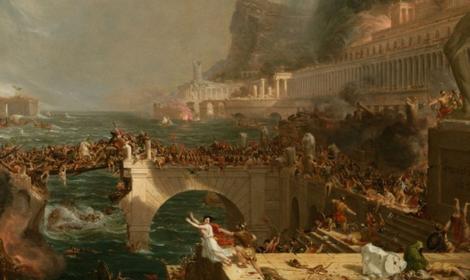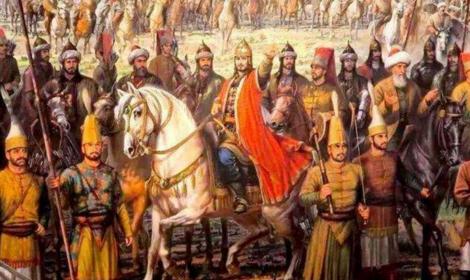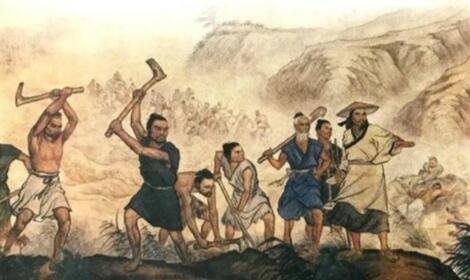罗马帝国灭亡的原因是什么?(二)
正文翻译

图。

图。
评论翻译
Scott Casey
There is an old saying you may have heard of: “Rome wasn't built in a day"
Well, it didn't fall in a day either.
The Roman Empire survived until the mid 15th century.
The cause of its long decline was simply the inability to defend it's territorial claims against expansionist neighbours.
你可能听说过一句老话:“罗马不是一日建成的。” 同样,它的衰落也不是一天之内发生的。 罗马帝国一直存活到15世纪中期。 它长期衰落的原因就是无力抵御扩张主义邻国对其领土要求的挑战。
Ali Malik
The fall of the Roman Empire was a complex process that spanned several centuries and involved a combination of internal and external factors. Here are some of the main reasons why the Roman Empire fell:
罗马帝国的衰落是一个复杂的过程,跨越数个世纪,涉及内外因素的组合。以下是罗马帝国衰落的主要原因:
Economic troubles: The cost of maintaining a massive army, constructing monumental buildings and infrastructure, and supporting a vast bureaucracy eventually strained the Roman economy. The reliance on slave labor also prevented the development of new technologies and hindered economic growth.
经济问题: 维持一支庞大的军队,建造不朽的建筑和基础设施,以及支持一个庞大的官僚机构的费用,最终使罗马的经济变得紧张。对奴隶劳动的依赖也妨碍了新技术的发展,阻碍了经济增长。
Military overspending: The Roman Empire was engaged in constant warfare, which required expensive armies and costly infrastructure. The cost of these wars eventually led to severe economic hardship.
军事上的透支: 罗马帝国不断进行战争,这需要昂贵的军队和昂贵的基础设施。这些战争的费用最终导致了严重的经济困难。
Political instability: The Roman Empire was plagued by political instability, with frequent power struggles and assassinations leading to a lack of effective leadership. The emperors also faced the challenge of trying to maintain the loyalty of the military while keeping control of the government.
Barbarian invasions: The Roman Empire faced pressure from barbarian tribes, who increasingly encroached on Roman territory and posed a military threat. These invasions were made worse by internal turmoil and the weakened state of the Roman military.
政治不稳定: 罗马帝国受到政治不稳定的困扰,频繁的权力斗争和暗杀导致缺乏有效的领导。皇帝们还面临着如何在保持对政府的控制的同时维持军队的忠诚度的挑战。
蛮族入侵: 罗马帝国面临着来自野蛮人部落的压力,他们越来越多地侵占罗马的领土并构成军事威胁。这些入侵由于内部动荡和罗马军队的衰弱而变得更加严重。
Social decay: The decline of traditional Roman values and morals, coupled with the rise of individualism and hedonism, led to a breakdown of social cohesion and a decline in civic responsibility.
Environmental factors: Drought, famine, disease, and other environmental factors contributed to the decline of the Roman Empire. These factors made it harder to maintain the agricultural and economic base that supported the empire.
Overexpansion: The Roman Empire grew to an enormous size, which made it difficult to govern effectively. This overexpansion weakened the empire and made it vulnerable to external threats.
社会衰败: 传统罗马价值观和道德的衰落,加上个人主义和享乐主义的兴起,导致了社会凝聚力的崩溃和公民责任感的下降。
环境因素: 干旱、饥荒、疾病和其他环境因素促成了罗马帝国的衰落。这些因素使得支持帝国的农业和经济基础更难维持。
过度扩张: 罗马帝国发展到了一个巨大的规模,这使得它难以有效治理。这种过度扩张削弱了帝国的实力,使其容易受到外部威胁。
The fall of the Roman Empire was a complex and multifaceted process that involved a combination of these factors. While historians continue to debate the exact causes of the fall, it is clear that a combination of economic, military, political, and social factors all contributed to the decline and eventual collapse of one of the greatest empires in history.
罗马帝国的衰落是一个复杂而多面的过程,涉及到这些因素的组合。虽然历史学家继续争论衰落的确切原因,但很明显,经济、军事、政治和社会因素的结合都导致了历史上最伟大的帝国之一的衰落和最终崩溃。
Sven Dirks
There is no “the reason”, but quite a number of contributing factors. Here is a short list, which is by no means complete and also not entirely undisputed.
Overextension. The empire was vast, hard to control and difficult to administer. The military supply lines where very much overstretched.
The growing divide between the poor and the rich. The buying power of the lower and middle classes was in slow but steady decline, while the rich got filthy rich. (Rings a bell?)
没有什么 "原因",但有相当多的促成因素。下面是一个简短的清单,它绝不是完整的,也不是完全无可争议的。
过度扩张。帝国幅员辽阔,难以控制,难以管理。军事补给线严重透支。
穷人和富人之间的鸿沟越来越大。中下层阶级的购买力在缓慢但稳定地下降,而富人则变得非常富有。(有印象吗?)
The complacency not only of the ruling class. Things had been “good” for quite a while, so the incentive for “going the extra mile” diminished with time, at least for proper citizens of the Roman empire.
The rise of Christianity and the anti scientific stance of that religion.
Pressure from external tribes and peoples.
Treatment of the military veterans. There was not enough arable land left to give the veterans their plot after 20 years of service. Leading to them becoming impoverished and quite often criminal.
Dependence on far away regions for food and and other products, for instance wood, since the Mediterranean lands had been deforested.
统治阶级的自满不只是问题所在。事情已经好了一段时间,因此去做额外的事情的动力随着时间的推移减少,至少对于罗马帝国的公民来说是这样。 基督教的兴起和它反科学的立场。 外部部族和人民的压力。 对军事退伍老兵的待遇。留给他们20年服役后的土地已经不足以支持他们生活,导致他们贫困化并经常犯罪。 依赖远离区域的食品和其他产品,例如木材,因为地中海地区的森林已经枯竭。
History
The Holy Roman Empire, the largest and most powerful state in Europe from the 9th century to the 18th, was a central player in European politics during the medi period. It included many Germanic-speaking countries, including most of present-day Germany, Austria, the Czech Republic, and Slovenia. The name “Holy Roman Empire” derives from the medi belief that the Roman Empire was the second empire of the world after the “Holy Roman Empire,” which
While the Holy Roman Empire was a complex political entity, it is crucial to understand the causes of its collapse. The reasons for failure include introducing new technologies, social changes within the empire, and war.
神圣罗马帝国是欧洲从9世纪到18世纪最大和最强大的国家,是中世纪时期欧洲政治的核心角色。它包括许多讲日耳曼语的国家,包括今天的德国、奥地利、捷克共和国和斯洛文尼亚的大部分地区。神圣罗马帝国 "这一名称源于中世纪的一个信念,即罗马帝国是继 "神圣罗马帝国 "之后的世界第二大帝国。
虽然神圣罗马帝国是一个复杂的政治实体,但了解其崩溃的原因是至关重要的。失败的原因包括引进新技术、帝国内部的社会变革和战争。
The Holy Roman Empire had served as a symbol of the unity of Christianity. However, when the HRE collapsed in 1806, the new German states could claim a unified nation under their leadership.
I argue the empire disappeared due to the internal conflicts of the Holy Roman Empire and the effects of the Reformation on the kingdom.
The Holy Roman Empire was a political organization that united the German lands from the tenth century to 1806. It was a political unx of the Holy Roman Empire, which lasted from the fourth to the sixteenth century.
神圣罗马帝国曾是基督教统一的象征。然而,当神圣罗马帝国在1806年瓦解时,新的德意志各州可以声称在他们的领导下有一个统一的国家。
我认为,帝国的消失是由于神圣罗马帝国的内部冲突和宗教改革对王国的影响。
神圣罗马帝国是一个政治组织,从十世纪到1806年将德国的土地统一起来。它是神圣罗马帝国的政治联盟,从第四世纪到第十六世纪一直持续。
Giorgio Ellina
Roman civilization did not die a natural death. It was murdered and dismembered by Germanic warlike groups. Indeed the most straightforward cause for Western Rome's collapse is the large domino of barbarian invasions and migrations in the 3th-5th centuries C.E.The 3rd century A.D. was marked by the proper start of the Germanic Migration Period also known as the “Volkerwanderung”. Numerous Germanic peoples had left their original breeding grounds in northern Germany and Scandinavia due to pressure caused by overpopulation, climatic changes and search for better land in the South. These large-scale migrations were accompanied by invasions that encroached beyond Rome's borders with profound acts of violence.
罗马文明并非自然而然地消亡。它被日耳曼战斗民族所杀害和分裂。事实上,西罗马崩溃最直接的原因是3至5世纪的条顿人入侵和迁徙所引发的大多米诺骨牌效应。公元3世纪以来,是日耳曼迁移时期的开始,也称为“部落大迁徙”。由于人口过剩、气候变化和南方寻找更好土地等压力,许多日耳曼民族离开了他们在北德意志和斯堪的纳维亚半岛的原生地。这些大规模的迁移伴随着向罗马边境蔓延的入侵,犯下了深刻的暴力行为。
Bands of warriors from large groups like the Goths had even found use as mercenaries within the ranks of the Roman army. Sooner than later they acted as warlords and began to claim Roman lands for their newly established barbarian kingdoms. For example the Salian Franks had been Roman soldiers when they marched against Roman Gaul in order to fill in the gap.
In the 5th century the Germanic threat was further complicated by the arrival of the Huns, an Asiatic warlike tribe. Under Attila the Hun they established a tribal confederation centered in Pannonia (modern day Hungary) from where they would extend their control over various Germanic groups, creating a fearsome coalition which wreaked havoc and desolation within the Roman Empire.
Eventually the two halves of the Roman empire were to suffer totally different fates as in 476 C.E. the Roman civilization was virtually extinquished in the West as opposed to the Eastern Empire which regrouped and survived until 1453.
像哥特人这样的大团体的战士甚至被用作罗马军队内的雇佣兵。很快他们便成为军阀,并开始为他们新建立的野蛮王国声张对罗马土地的主权。例如,萨利安法兰克人曾经是罗马士兵,当他们走向罗马高卢以填补空缺时。 在第五世纪,日耳曼威胁因亚洲战斗民族匈奴人的到来而进一步复杂化。在匈奴人阿提拉的领导下,他们在潘诺尼亚(现代匈牙利)建立了一个部落联盟,并延长其对各种日耳曼团体的控制范围,创造了一个可怕的联盟,在罗马帝国内造成了破坏和荒凉。 最终,罗马帝国的两个部分将遭受完全不同的命运,在公元476年,罗马文明在西方几乎灭亡,而东部帝国则重新组合并幸存至1453年。
Matt Riggsby
There was a whole stack of reasons for the fall of Rome. These include:
1.Long-term environmental problems like soil exhaustion.
2.Slightly shorter term environmental issues like climate shifts in the third century, which both shattered the imperial economy and kicked off external problems.
3.Constant military pressure on the empire’s borders, partly as a consequence of #2.
4.Overextension of the empire to control too many people over too much area, exacerbated by #3.
5.Weak institutions and free-for-all rules for imperial succession leading to recurring internal conflicts, exacerbated by #4.
罗马灭亡有许多原因: 1.长期的环境问题,如土地耗竭。 2.稍短期的环境问题,如公元三世纪的气候变化,既摧毁了帝国经济,也引发了外部问题。 3.帝国边境的持续军事压力,部分是第二点的后果。 4.过度扩张的帝国控制了过多人口和面积,加剧了第三点的影响。 5.机构薄弱和皇位继承的自由规则导致不断发生内部冲突,并加重了第四点的影响。
And that’s just major factors. There’s enough going on that you can’t really compare Rome’s collapse to modern progressive or conservative movements with any real accuracy. But this does serve as a sort of Rorschach test for partisans and people who don’t understand history, since people can reach into the complicated web of circumstance and emphasize anything they want. For example, people of one sort of political tendency might point to Germanic migrations and the grain dole in Rome and blame it on “liberal” policies. Others might point to constant failures to reform the imperial government into something more sustainable or the widespread adoption of Christianity and blame it on “conservative” attitudes. But ultimately these are all attempts to map narrow modern understandings of politics and economics onto very different societies.
而这只是主要因素而已。有足够的事情发生,你无法真正准确地将罗马帝国的崩溃与现代进步或保守运动进行比较。但这确实可以作为一种rorschach测试,用于测验党派人士和不了解历史的人,因为人们可以深入到错综复杂的情况网络中,强调他们想要的任何事物。例如,某一种倾向的人可能会指出日耳曼移民和罗马的粮食救济,并将其归咎于“自由派”政策。其他人可能会指出,对将皇家改革成为更可持续性的形式的不断失败或*的广泛采用,并将其归咎于“保守”态度。但最终,这些都是试图将狭隘的现代和经济观念映射到非常不同的社会上的企图。
Raunak Sapkota
Because of the Antonine plague.
The Antonine plague was an epidemic that was carried to Rome by Roman soldiers around AD 165–166. They had carried it from Mesopotamia, where they had fought and were returning home. The plague pretty much fucked the whole city, and in many a ways you would not expect.
Let me digress a bit, because some of you might argue that the Roman empire truly ended around AD 547 when the Ostrogoths sacked the city (preceded by two more sackings from the Vandals and the Visigoths in 440 and 410 respectively.)
But then the question arises: how did the Roman empire turn out so badly that three separate civilizations could sack it in the span of 150 years?
由于安东尼瘟疫的影响。 安东尼瘟疫是公元165-166年罗马士兵从美索不达米亚带回罗马的一种流行病。他们在那里参加战斗并返回家园时携带了这种瘟疫。这种瘟疫严重地影响了整座城市,在许多意想不到的方面都造成了深刻的影响。 让我稍微偏离一下,因为有些人可能会认为罗马帝国真正灭亡是在公元547年奥斯特哥特人攻打城市时(此前,范多尔人和卫桥人分别于440年和410年攻打过罗马)。 但是问题又来了:为什么罗马帝国会变得如此糟糕,以至于在150年的时间内三个不同的文明都能征服它?
That question is what brings us to the Antonine plague.
Continuing where I left off, the Antonine plague turned out to be truly horrendous, as reported by Roman physicist-and-scaredy cat Galen, who claims:
The victims had spots over the body that turned into rash and eventually fell off as scabs, accompanied by a blister fever that was hard to identify.
People died. A lot of them. Some cases report that there was as many as 2, 000 deaths per day. Like, for real.
把我们带到安东尼瘟疫这个问题。继续上次的话题,罗马物理学家和胆小鬼加林报告说,安东尼瘟疫实际上非常可怕,他们声称: 受害者身上出现斑点,最终变成皮疹,最后掉落下来成为痂皮,伴随着一种难以辨别的水泡型发热。 人们死亡了。很多人。有些报道称每天有多达2,000人死亡。真的,没有开玩笑。
Here’s how the Antonine plague pretty much went harsh-anal on Rome:
1.The military suffered. Since it was carried military, many legions faced mass mortality. Many of the 143000 soldiers were dying. And if you think that’s a small number, the US now has 520, 000 military members active. Seriously, it’s not something to feign over when the population was 25 times smaller.
2.The Germanic tribes attacked. When a nearly-naked tribe attacks you with ferocious anger in the middle of a plague that’s eating you, you know you’re in trouble. And not one, but there were multiple clans of these tribes that kept pestering Rome.
3.The economy suffered. The emperor Marcus Aurelius had to use gladiators and thieves in the army because of the mortality, who demanded pay, and then there were the hucksters who robbed people of money by selling fake medicines. Not yo mention, the lack of gladiators made bloodsport very expensive. And you’d think people would be more focused on food and survival during a time like that.
4.Society suffered. The Christians became the primary scapegoat for the disease and they were killed in such terroble ways it caused mass panic and disorder. Marcus allowed this to happen despite being stoic, due to his hatred towards Christuans derived from the fact that he believed they were too eager to achieve martyrdom.
以下是安东尼瘟疫给罗马带来的影响: 1.军队遭受重创,由于瘟疫是由士兵携带而来,许多军团面临着大规模死亡。当时有14.3万名士兵死亡,如果你认为这个数字很小,那么请注意现在美国活跃的军事人员数量已经达到52万,对于人口是现在的1/25那样的罗马来说,死亡数量是非常惊人的。 2.日耳曼部落袭击带来了更多困难,在瘟疫肆虐的时候,裸露的日耳曼部落居然还向罗马发起了凶猛攻击,而且不止一个,多个部落一再地骚扰罗马。 3.经济也遭受了严重打击,马可・奥雷留斯皇帝因为瘟疫死亡率的影响,必须使用角斗士和盗贼来增补军队,这些人自然是要支付报酬的。同时,还有欺诈者通过销售假药骗取钱财。角斗士的缺乏还使得血腥娱乐变得非常昂贵。在这样的时期,人们认为孤注一掷而忽视了食物和生存。 4.整个社会也遭受了打击,基督徒成为疾病的主要替罪羊,他们被以极其可怕的方式杀害,引发了大规模的恐慌和混乱。马库斯虽然是一个斯多葛主义者,但出于对基督徒的仇恨,默许这些暴行的发生,因为他认为基督徒渴望殉道太过急切。
The population suffered. Over 18 million people died in the plague, and that is just an estimate.
So basically, the entire system was in a turmoil. Marcus was great at handling the war temporarily (he sold his own property to finance the war), but the city suffered heavy losses from the ongoing attacks of the Germanic tribes, which were finally silenced as a result of a peace treaty.
But here comes the twist: prior to making a treaty and releasing them, the Germanic tribes had captured upwards of 160, 000 Roman soldiers. No, that’s not a typo. A hundred and sixty thousand soldiers were captured by the Germanic tribes in the war.
You might not understand the severity of that event. Five years before that you could walk around the entire Earth for free—with the best hospitality— if you said “I’m a Roman citizen.” That was the power of the civilization. But what would happen when the world knew that 160, 000 of your soldiers were bested by a bunch of naked barbarians?
人口遭受了灾难,超过1800万人死于瘟疫,这只是一个估计数字。整个系统处于混乱状态。马库斯在暂时处理战争方面表现出色(他出售了自己的财产来筹集战争资金),但城市在日益增多的日耳曼部落攻击中损失惨重,最终通过一项和平条约来消除了这些攻击。但是有一个转折点:在缔结条约并释放日耳曼人之前,日耳曼部落俘虏了超过160000名罗马士兵。不,那不是笔误。 16万名士兵在战争中被日耳曼部落俘虏了。你可能不理解该事件的严重性。在那之前的五年里,如果你说“我是罗马公民”,你可以免费周游世界,享受最好的待遇。这就是文明的力量。但当世界知道你的160,000名士兵被一群**的野蛮人打败时,会发生什么?
Nothing was ever the same anymore. The army was in tangles, the economy was plummeting, society was in disorder. Everything was in a mess, all pointing to the Antonine plague. Some historians claim Marcus Aurelius could have taken Rome back to its glory, but the plague claimed him too, because he died a short time after the treaty, possibly due to the effects of the plague itself.
I once again repeat, nothing was the same anymore. The word “Roman” didn’t carry weight at all, especially after such a humiliating incident with the Germanic people. The world stopped taking Rome seriously, and so did Rome itself.
From then on Rome turned into a weak civilization, especially with following rulers like Commodus, who was too busy poisoning politicians, murdering ostriches and engaging in incest with his sisters to do anything progressive.
一切再也不是同样的了。军队混乱不堪,经济急剧下滑,社会处于混乱状态。所有这些都指向安东尼瘟疫的影响。一些历史学家声称,马库斯・奥雷留斯本可以让罗马重返其荣光,但他也死于瘟疫,可能由于瘟疫本身的影响,在和约后不久他就去世了。 我再次强调,一切都已经变得不同了。“罗马”这个词根本就没有分量,尤其是在与日耳曼人发生了羞辱性事件之后。全世界停止认真对待罗马,罗马自己也开始这么做。 从那时起,罗马变成了一个虚弱的文明,特别是随后的皇帝像康茂德,他忙于毒杀政治家、杀死鸵鸟并与他的姐妹进行乱伦,而无暇推进任何改革。
Commodus approves of this answer. And yes, he was the villain in the Gladiator movie.
He lived his life in city luxury without caring about the impending war dangers, the plague still killing thousands regularly, and the fact that Rome was spiraling down a hole. A glory-hole, you could call it. It was plummeting faster than Kim Jung-Un confronted with a treadmill.
The end of Rome was inevitable and it is surprising the civilization lasted up to 547 AD, but then again, Roman warriors were strong to begin with, even though by this time they were so misaligned, you could call them the Night’s Watch.
康茂德认可这个答案。是的,他在电影《角斗士》中扮演了反派。 他过着城市里的奢华生活,对即将发生的战争危险、不断夺取成千上万性命的瘟疫以及罗马正在掉入一个无底洞毫不关心。你可以把这个洞称为荣耀洞。罗马比金正恩面对跑步机时下降得更快。 罗马的末日注定而来,令人惊讶的是这个文明居然持续到公元547年才走向终结。尽管如此,罗马的士兵始终是非常强壮的,即使在这个时期他们变得混乱不堪,也可称之为守夜人。
So they kept taking a beating after beating, and the end was nearer every time they did so. Like I mentioned above, the deciding battles were when the Visigoths sacked them in 410 AD, the Vandals sacked them in 440 AD, and finally the Ostrogoths sacked them in 547 AD, collectively so badly that about a few hundred Roman citizens were left when the Ostrogoths were done running them to the ground.
You know your civilization is over when your population is less than 0.001% of what it was 4 centuries ago.
Rome had ended.
All because of the Antonine plague.
所以他们一次又一次地遭到了打击,临近终结。正如我上面提到的,决定性的战役是410年西哥特人的袭击、440年瓦达尔人的袭击,最后是547年奥斯特戈特人的袭击,集体造成的破坏是如此之大,以至于当奥斯特戈特人将他们打败时,只剩下几百个罗马公民。 当你的人口不到4个世纪前的0.001%时,你知道你的文明已经结束了。 罗马终结了。 所有这一切都是因为安东尼瘟疫。
Steve Dutch
It fell before it even began.
After defeating Carthage in the Second Punic War (ended 201 BCE) Rome claimed the former Carthaginian territories in Spain. Rather than admit the inhabitants as equals, Rome decided to exploit Spain for revenue and slaves.
Up till then, Rome had been lurching zombie-like toward a more egalitarian society. Political power was gerrymandered in favor of the rich, but when unrest grew too strong, concessions and reforms were made. Rome’s policies in Spain meant more or less non-stop guerrilla war for the next few centuries. To occupy Spain, Rome needed troops, but troops could barely get to Spain before having to return under the old military model. So Rome established a standing army. Soldiers posted to Spain frequently found their farms lost in debt. Wealth re-concentrated in the hands of the wealthy. Rome experienced mounting unrest, several civil wars, and finally a coup under Julius Caesar. There is still no Empire yet. Only after Julius’ son Augustus triumphs over his adversaries do historians speak of the Roman Empire.
Like a baby born with AIDS, the Roman Empire was infected at birth with what eventually killed it.
它甚至在开始之前就倒下了。 在第二次布匿战争中(201年结束)击败迦太基后,罗马声称拥有西班牙的前迦太基领土。罗马决定剥削西班牙以获取收入和奴隶,而非将当地居民视为平等人。到那时,罗马一直在朝着更加平等的社会迈进。权力偏向富人,但当动荡愈演愈烈时,妥协和改革被实施了。罗马在西班牙的政策意味着未来几个世纪基本上持续不断的游击战。为了占领西班牙,罗马需要士兵,但根据旧的模式,士兵几乎无法到达西班牙就必须返回。因此罗马建立了常备军。被派往西班牙的士兵经常发现他们的农场陷入了债务。财富重新集中在富人手中。罗马经历了越来越多的动荡,几起内战,最终在朱利叶斯·凯撤的下爆发。这时尚不存在帝国。只有在朱利的儿子奥古斯都击败了他的对手之后,历史学家才开始谈论罗马帝国。 就像一个感染了艾滋病毒的婴儿一样,罗马帝国在出生时就被感染了最终导致了它的死亡的因
Addendum
Edward Gibbon wrote this:
As the happiness of a future life is the great obxt of religion, we may hear without surprise or scandal that the introduction, or at least the abuse of Christianity, had some influence on the decline and fall of the Roman empire. The clergy successfully preached the doctrines of patience and pusillanimity; the active virtues of society were discouraged; and the last remains of military spirit were buried in the cloister: a large portion of public and private wealth was consecrated to the specious demands of charity and devotion; and the soldiers' pay was lavished on the useless multitudes of both sexes who could only plead the merits of abstinence and chastity. Faith, zeal, curiosity, and more earthly passions of malice and ambition, kindled the flame of theological discord; the church, and even the state, were distracted by religious factions, whose conflicts were sometimes bloody and always implacable; the attention of the emperors was diverted from camps to synods; the Roman world was oppressed by a new species of tyranny; and the persecuted sects became the secret enemies of their country. Yet party-spirit, however pernicious or absurd, is a principle of unx as well as of dissension. The bishops, from eighteen hundred pulpits, inculcated the duty of passive obedience to a lawful and orthodox sovereign; their frequent assemblies and perpetual correspondence maintained the communx of distant churches; and the benevolent temper of the Gospel was strengthened, though confirmed, by the spiritual alliance of the Catholics. The sacred indolence of the monks was devoutly embraced by a servile and effeminate age; but if superstition had not afforded a decent retreat, the same vices would have tempted the unworthy Romans to desert, from baser motives, the standard of the republic. Religious precepts are easily obeyed which indulge and sanctify the natural inclinations of their votaries; but the pure and genuine influence of Christianity may be traced in its beneficial, though imperfect, effects on the barbarian proselytes of the North. If the decline of the Roman empire was hastened by the conversion of Constantine, his victorious religion broke the violence of the fall, and mollified the ferocious temper of the conquerors (chap. 38)
Gibbon felt the rise of Christianity was partly responsible. The dead giveaway that people who compare America to Rome never read Decline and Fall of the Roman Empire is that they never cite this as a cause.
爱德华·吉本写道:
由于未来生活的幸福是宗教的主要目标,因此我们可以听到没有惊讶或争议的话,即基督教的引入或至少滥用对罗马帝国的衰落和崩溃产生了一定影响。教士成功地传播了耐心和懦弱的信条;社会的积极美德受到打压;军事精神的最后遗存掩埋在修道院中:大量的公共和私人财富被奉献给了慈善和虔诚的华丽诉求上;士兵的薪水被浪费在那些只能以自我节制和贞洁的优点为自豪的无用男女群众身上。信仰、热情、好奇心和更多世俗的憎恨和野心的激发,点燃了神学上的纷争之火;教会,甚至国家,都被宗教派系所分裂,他们的冲突有时是血腥的,而且总是不妥协的;皇帝们的注意力从军营转移到了教会会议上;罗马世界被新型的暴政所压迫;受迫害的教派成为了他们国家的秘密敌人。然而,派别争斗,无论多么有害或荒谬,都是团结和分裂的原则。从一千八百个讲坛上,主教们灌输了对合法和正统君主的顺从义务;他们经常的会议和不断的通信保持了远隔重洋教堂的交流;福音书中的慈爱气质因天主教徒的精神联盟而得到了加强,虽然也得到了确认。修道士的神圣懒惰被一个奴性而柔弱的时代虔诚地接纳;但如果迷信没有提供一个体面的庇护所,同样的恶习也会以更低劣的动机引诱不值得尊敬的罗马人离弃共和国的旗帜。宗教戒律容易被信徒们所遵守,因为它们放纵和圣化了他们的天性倾向;但基督教的纯洁而真实的影响可以在其对北方野蛮人改宗者的有益且不完美的影响中得以追溯。如果君士坦丁的皈依加速了罗马帝国的衰落,那么他胜利的宗教折断了帝国的陷落之势,并缓和了征服者的凶残性格。
吉本认为基督教的兴起部分负责了罗马帝国的衰落。将美国与罗马相比的人从未阅读过《罗马帝国衰亡史》,因为他们永远不会将这个当作原因之一。
There is an old saying you may have heard of: “Rome wasn't built in a day"
Well, it didn't fall in a day either.
The Roman Empire survived until the mid 15th century.
The cause of its long decline was simply the inability to defend it's territorial claims against expansionist neighbours.
你可能听说过一句老话:“罗马不是一日建成的。” 同样,它的衰落也不是一天之内发生的。 罗马帝国一直存活到15世纪中期。 它长期衰落的原因就是无力抵御扩张主义邻国对其领土要求的挑战。
Ali Malik
The fall of the Roman Empire was a complex process that spanned several centuries and involved a combination of internal and external factors. Here are some of the main reasons why the Roman Empire fell:
罗马帝国的衰落是一个复杂的过程,跨越数个世纪,涉及内外因素的组合。以下是罗马帝国衰落的主要原因:
Economic troubles: The cost of maintaining a massive army, constructing monumental buildings and infrastructure, and supporting a vast bureaucracy eventually strained the Roman economy. The reliance on slave labor also prevented the development of new technologies and hindered economic growth.
经济问题: 维持一支庞大的军队,建造不朽的建筑和基础设施,以及支持一个庞大的官僚机构的费用,最终使罗马的经济变得紧张。对奴隶劳动的依赖也妨碍了新技术的发展,阻碍了经济增长。
Military overspending: The Roman Empire was engaged in constant warfare, which required expensive armies and costly infrastructure. The cost of these wars eventually led to severe economic hardship.
军事上的透支: 罗马帝国不断进行战争,这需要昂贵的军队和昂贵的基础设施。这些战争的费用最终导致了严重的经济困难。
Political instability: The Roman Empire was plagued by political instability, with frequent power struggles and assassinations leading to a lack of effective leadership. The emperors also faced the challenge of trying to maintain the loyalty of the military while keeping control of the government.
Barbarian invasions: The Roman Empire faced pressure from barbarian tribes, who increasingly encroached on Roman territory and posed a military threat. These invasions were made worse by internal turmoil and the weakened state of the Roman military.
政治不稳定: 罗马帝国受到政治不稳定的困扰,频繁的权力斗争和暗杀导致缺乏有效的领导。皇帝们还面临着如何在保持对政府的控制的同时维持军队的忠诚度的挑战。
蛮族入侵: 罗马帝国面临着来自野蛮人部落的压力,他们越来越多地侵占罗马的领土并构成军事威胁。这些入侵由于内部动荡和罗马军队的衰弱而变得更加严重。
Social decay: The decline of traditional Roman values and morals, coupled with the rise of individualism and hedonism, led to a breakdown of social cohesion and a decline in civic responsibility.
Environmental factors: Drought, famine, disease, and other environmental factors contributed to the decline of the Roman Empire. These factors made it harder to maintain the agricultural and economic base that supported the empire.
Overexpansion: The Roman Empire grew to an enormous size, which made it difficult to govern effectively. This overexpansion weakened the empire and made it vulnerable to external threats.
社会衰败: 传统罗马价值观和道德的衰落,加上个人主义和享乐主义的兴起,导致了社会凝聚力的崩溃和公民责任感的下降。
环境因素: 干旱、饥荒、疾病和其他环境因素促成了罗马帝国的衰落。这些因素使得支持帝国的农业和经济基础更难维持。
过度扩张: 罗马帝国发展到了一个巨大的规模,这使得它难以有效治理。这种过度扩张削弱了帝国的实力,使其容易受到外部威胁。
The fall of the Roman Empire was a complex and multifaceted process that involved a combination of these factors. While historians continue to debate the exact causes of the fall, it is clear that a combination of economic, military, political, and social factors all contributed to the decline and eventual collapse of one of the greatest empires in history.
罗马帝国的衰落是一个复杂而多面的过程,涉及到这些因素的组合。虽然历史学家继续争论衰落的确切原因,但很明显,经济、军事、政治和社会因素的结合都导致了历史上最伟大的帝国之一的衰落和最终崩溃。
Sven Dirks
There is no “the reason”, but quite a number of contributing factors. Here is a short list, which is by no means complete and also not entirely undisputed.
Overextension. The empire was vast, hard to control and difficult to administer. The military supply lines where very much overstretched.
The growing divide between the poor and the rich. The buying power of the lower and middle classes was in slow but steady decline, while the rich got filthy rich. (Rings a bell?)
没有什么 "原因",但有相当多的促成因素。下面是一个简短的清单,它绝不是完整的,也不是完全无可争议的。
过度扩张。帝国幅员辽阔,难以控制,难以管理。军事补给线严重透支。
穷人和富人之间的鸿沟越来越大。中下层阶级的购买力在缓慢但稳定地下降,而富人则变得非常富有。(有印象吗?)
The complacency not only of the ruling class. Things had been “good” for quite a while, so the incentive for “going the extra mile” diminished with time, at least for proper citizens of the Roman empire.
The rise of Christianity and the anti scientific stance of that religion.
Pressure from external tribes and peoples.
Treatment of the military veterans. There was not enough arable land left to give the veterans their plot after 20 years of service. Leading to them becoming impoverished and quite often criminal.
Dependence on far away regions for food and and other products, for instance wood, since the Mediterranean lands had been deforested.
统治阶级的自满不只是问题所在。事情已经好了一段时间,因此去做额外的事情的动力随着时间的推移减少,至少对于罗马帝国的公民来说是这样。 基督教的兴起和它反科学的立场。 外部部族和人民的压力。 对军事退伍老兵的待遇。留给他们20年服役后的土地已经不足以支持他们生活,导致他们贫困化并经常犯罪。 依赖远离区域的食品和其他产品,例如木材,因为地中海地区的森林已经枯竭。
History
The Holy Roman Empire, the largest and most powerful state in Europe from the 9th century to the 18th, was a central player in European politics during the medi period. It included many Germanic-speaking countries, including most of present-day Germany, Austria, the Czech Republic, and Slovenia. The name “Holy Roman Empire” derives from the medi belief that the Roman Empire was the second empire of the world after the “Holy Roman Empire,” which
While the Holy Roman Empire was a complex political entity, it is crucial to understand the causes of its collapse. The reasons for failure include introducing new technologies, social changes within the empire, and war.
神圣罗马帝国是欧洲从9世纪到18世纪最大和最强大的国家,是中世纪时期欧洲政治的核心角色。它包括许多讲日耳曼语的国家,包括今天的德国、奥地利、捷克共和国和斯洛文尼亚的大部分地区。神圣罗马帝国 "这一名称源于中世纪的一个信念,即罗马帝国是继 "神圣罗马帝国 "之后的世界第二大帝国。
虽然神圣罗马帝国是一个复杂的政治实体,但了解其崩溃的原因是至关重要的。失败的原因包括引进新技术、帝国内部的社会变革和战争。
The Holy Roman Empire had served as a symbol of the unity of Christianity. However, when the HRE collapsed in 1806, the new German states could claim a unified nation under their leadership.
I argue the empire disappeared due to the internal conflicts of the Holy Roman Empire and the effects of the Reformation on the kingdom.
The Holy Roman Empire was a political organization that united the German lands from the tenth century to 1806. It was a political unx of the Holy Roman Empire, which lasted from the fourth to the sixteenth century.
神圣罗马帝国曾是基督教统一的象征。然而,当神圣罗马帝国在1806年瓦解时,新的德意志各州可以声称在他们的领导下有一个统一的国家。
我认为,帝国的消失是由于神圣罗马帝国的内部冲突和宗教改革对王国的影响。
神圣罗马帝国是一个政治组织,从十世纪到1806年将德国的土地统一起来。它是神圣罗马帝国的政治联盟,从第四世纪到第十六世纪一直持续。
Giorgio Ellina
Roman civilization did not die a natural death. It was murdered and dismembered by Germanic warlike groups. Indeed the most straightforward cause for Western Rome's collapse is the large domino of barbarian invasions and migrations in the 3th-5th centuries C.E.The 3rd century A.D. was marked by the proper start of the Germanic Migration Period also known as the “Volkerwanderung”. Numerous Germanic peoples had left their original breeding grounds in northern Germany and Scandinavia due to pressure caused by overpopulation, climatic changes and search for better land in the South. These large-scale migrations were accompanied by invasions that encroached beyond Rome's borders with profound acts of violence.
罗马文明并非自然而然地消亡。它被日耳曼战斗民族所杀害和分裂。事实上,西罗马崩溃最直接的原因是3至5世纪的条顿人入侵和迁徙所引发的大多米诺骨牌效应。公元3世纪以来,是日耳曼迁移时期的开始,也称为“部落大迁徙”。由于人口过剩、气候变化和南方寻找更好土地等压力,许多日耳曼民族离开了他们在北德意志和斯堪的纳维亚半岛的原生地。这些大规模的迁移伴随着向罗马边境蔓延的入侵,犯下了深刻的暴力行为。
Bands of warriors from large groups like the Goths had even found use as mercenaries within the ranks of the Roman army. Sooner than later they acted as warlords and began to claim Roman lands for their newly established barbarian kingdoms. For example the Salian Franks had been Roman soldiers when they marched against Roman Gaul in order to fill in the gap.
In the 5th century the Germanic threat was further complicated by the arrival of the Huns, an Asiatic warlike tribe. Under Attila the Hun they established a tribal confederation centered in Pannonia (modern day Hungary) from where they would extend their control over various Germanic groups, creating a fearsome coalition which wreaked havoc and desolation within the Roman Empire.
Eventually the two halves of the Roman empire were to suffer totally different fates as in 476 C.E. the Roman civilization was virtually extinquished in the West as opposed to the Eastern Empire which regrouped and survived until 1453.
像哥特人这样的大团体的战士甚至被用作罗马军队内的雇佣兵。很快他们便成为军阀,并开始为他们新建立的野蛮王国声张对罗马土地的主权。例如,萨利安法兰克人曾经是罗马士兵,当他们走向罗马高卢以填补空缺时。 在第五世纪,日耳曼威胁因亚洲战斗民族匈奴人的到来而进一步复杂化。在匈奴人阿提拉的领导下,他们在潘诺尼亚(现代匈牙利)建立了一个部落联盟,并延长其对各种日耳曼团体的控制范围,创造了一个可怕的联盟,在罗马帝国内造成了破坏和荒凉。 最终,罗马帝国的两个部分将遭受完全不同的命运,在公元476年,罗马文明在西方几乎灭亡,而东部帝国则重新组合并幸存至1453年。
Matt Riggsby
There was a whole stack of reasons for the fall of Rome. These include:
1.Long-term environmental problems like soil exhaustion.
2.Slightly shorter term environmental issues like climate shifts in the third century, which both shattered the imperial economy and kicked off external problems.
3.Constant military pressure on the empire’s borders, partly as a consequence of #2.
4.Overextension of the empire to control too many people over too much area, exacerbated by #3.
5.Weak institutions and free-for-all rules for imperial succession leading to recurring internal conflicts, exacerbated by #4.
罗马灭亡有许多原因: 1.长期的环境问题,如土地耗竭。 2.稍短期的环境问题,如公元三世纪的气候变化,既摧毁了帝国经济,也引发了外部问题。 3.帝国边境的持续军事压力,部分是第二点的后果。 4.过度扩张的帝国控制了过多人口和面积,加剧了第三点的影响。 5.机构薄弱和皇位继承的自由规则导致不断发生内部冲突,并加重了第四点的影响。
And that’s just major factors. There’s enough going on that you can’t really compare Rome’s collapse to modern progressive or conservative movements with any real accuracy. But this does serve as a sort of Rorschach test for partisans and people who don’t understand history, since people can reach into the complicated web of circumstance and emphasize anything they want. For example, people of one sort of political tendency might point to Germanic migrations and the grain dole in Rome and blame it on “liberal” policies. Others might point to constant failures to reform the imperial government into something more sustainable or the widespread adoption of Christianity and blame it on “conservative” attitudes. But ultimately these are all attempts to map narrow modern understandings of politics and economics onto very different societies.
而这只是主要因素而已。有足够的事情发生,你无法真正准确地将罗马帝国的崩溃与现代进步或保守运动进行比较。但这确实可以作为一种rorschach测试,用于测验党派人士和不了解历史的人,因为人们可以深入到错综复杂的情况网络中,强调他们想要的任何事物。例如,某一种倾向的人可能会指出日耳曼移民和罗马的粮食救济,并将其归咎于“自由派”政策。其他人可能会指出,对将皇家改革成为更可持续性的形式的不断失败或*的广泛采用,并将其归咎于“保守”态度。但最终,这些都是试图将狭隘的现代和经济观念映射到非常不同的社会上的企图。
Raunak Sapkota
Because of the Antonine plague.
The Antonine plague was an epidemic that was carried to Rome by Roman soldiers around AD 165–166. They had carried it from Mesopotamia, where they had fought and were returning home. The plague pretty much fucked the whole city, and in many a ways you would not expect.
Let me digress a bit, because some of you might argue that the Roman empire truly ended around AD 547 when the Ostrogoths sacked the city (preceded by two more sackings from the Vandals and the Visigoths in 440 and 410 respectively.)
But then the question arises: how did the Roman empire turn out so badly that three separate civilizations could sack it in the span of 150 years?
由于安东尼瘟疫的影响。 安东尼瘟疫是公元165-166年罗马士兵从美索不达米亚带回罗马的一种流行病。他们在那里参加战斗并返回家园时携带了这种瘟疫。这种瘟疫严重地影响了整座城市,在许多意想不到的方面都造成了深刻的影响。 让我稍微偏离一下,因为有些人可能会认为罗马帝国真正灭亡是在公元547年奥斯特哥特人攻打城市时(此前,范多尔人和卫桥人分别于440年和410年攻打过罗马)。 但是问题又来了:为什么罗马帝国会变得如此糟糕,以至于在150年的时间内三个不同的文明都能征服它?
That question is what brings us to the Antonine plague.
Continuing where I left off, the Antonine plague turned out to be truly horrendous, as reported by Roman physicist-and-scaredy cat Galen, who claims:
The victims had spots over the body that turned into rash and eventually fell off as scabs, accompanied by a blister fever that was hard to identify.
People died. A lot of them. Some cases report that there was as many as 2, 000 deaths per day. Like, for real.
把我们带到安东尼瘟疫这个问题。继续上次的话题,罗马物理学家和胆小鬼加林报告说,安东尼瘟疫实际上非常可怕,他们声称: 受害者身上出现斑点,最终变成皮疹,最后掉落下来成为痂皮,伴随着一种难以辨别的水泡型发热。 人们死亡了。很多人。有些报道称每天有多达2,000人死亡。真的,没有开玩笑。
Here’s how the Antonine plague pretty much went harsh-anal on Rome:
1.The military suffered. Since it was carried military, many legions faced mass mortality. Many of the 143000 soldiers were dying. And if you think that’s a small number, the US now has 520, 000 military members active. Seriously, it’s not something to feign over when the population was 25 times smaller.
2.The Germanic tribes attacked. When a nearly-naked tribe attacks you with ferocious anger in the middle of a plague that’s eating you, you know you’re in trouble. And not one, but there were multiple clans of these tribes that kept pestering Rome.
3.The economy suffered. The emperor Marcus Aurelius had to use gladiators and thieves in the army because of the mortality, who demanded pay, and then there were the hucksters who robbed people of money by selling fake medicines. Not yo mention, the lack of gladiators made bloodsport very expensive. And you’d think people would be more focused on food and survival during a time like that.
4.Society suffered. The Christians became the primary scapegoat for the disease and they were killed in such terroble ways it caused mass panic and disorder. Marcus allowed this to happen despite being stoic, due to his hatred towards Christuans derived from the fact that he believed they were too eager to achieve martyrdom.
以下是安东尼瘟疫给罗马带来的影响: 1.军队遭受重创,由于瘟疫是由士兵携带而来,许多军团面临着大规模死亡。当时有14.3万名士兵死亡,如果你认为这个数字很小,那么请注意现在美国活跃的军事人员数量已经达到52万,对于人口是现在的1/25那样的罗马来说,死亡数量是非常惊人的。 2.日耳曼部落袭击带来了更多困难,在瘟疫肆虐的时候,裸露的日耳曼部落居然还向罗马发起了凶猛攻击,而且不止一个,多个部落一再地骚扰罗马。 3.经济也遭受了严重打击,马可・奥雷留斯皇帝因为瘟疫死亡率的影响,必须使用角斗士和盗贼来增补军队,这些人自然是要支付报酬的。同时,还有欺诈者通过销售假药骗取钱财。角斗士的缺乏还使得血腥娱乐变得非常昂贵。在这样的时期,人们认为孤注一掷而忽视了食物和生存。 4.整个社会也遭受了打击,基督徒成为疾病的主要替罪羊,他们被以极其可怕的方式杀害,引发了大规模的恐慌和混乱。马库斯虽然是一个斯多葛主义者,但出于对基督徒的仇恨,默许这些暴行的发生,因为他认为基督徒渴望殉道太过急切。
The population suffered. Over 18 million people died in the plague, and that is just an estimate.
So basically, the entire system was in a turmoil. Marcus was great at handling the war temporarily (he sold his own property to finance the war), but the city suffered heavy losses from the ongoing attacks of the Germanic tribes, which were finally silenced as a result of a peace treaty.
But here comes the twist: prior to making a treaty and releasing them, the Germanic tribes had captured upwards of 160, 000 Roman soldiers. No, that’s not a typo. A hundred and sixty thousand soldiers were captured by the Germanic tribes in the war.
You might not understand the severity of that event. Five years before that you could walk around the entire Earth for free—with the best hospitality— if you said “I’m a Roman citizen.” That was the power of the civilization. But what would happen when the world knew that 160, 000 of your soldiers were bested by a bunch of naked barbarians?
人口遭受了灾难,超过1800万人死于瘟疫,这只是一个估计数字。整个系统处于混乱状态。马库斯在暂时处理战争方面表现出色(他出售了自己的财产来筹集战争资金),但城市在日益增多的日耳曼部落攻击中损失惨重,最终通过一项和平条约来消除了这些攻击。但是有一个转折点:在缔结条约并释放日耳曼人之前,日耳曼部落俘虏了超过160000名罗马士兵。不,那不是笔误。 16万名士兵在战争中被日耳曼部落俘虏了。你可能不理解该事件的严重性。在那之前的五年里,如果你说“我是罗马公民”,你可以免费周游世界,享受最好的待遇。这就是文明的力量。但当世界知道你的160,000名士兵被一群**的野蛮人打败时,会发生什么?
Nothing was ever the same anymore. The army was in tangles, the economy was plummeting, society was in disorder. Everything was in a mess, all pointing to the Antonine plague. Some historians claim Marcus Aurelius could have taken Rome back to its glory, but the plague claimed him too, because he died a short time after the treaty, possibly due to the effects of the plague itself.
I once again repeat, nothing was the same anymore. The word “Roman” didn’t carry weight at all, especially after such a humiliating incident with the Germanic people. The world stopped taking Rome seriously, and so did Rome itself.
From then on Rome turned into a weak civilization, especially with following rulers like Commodus, who was too busy poisoning politicians, murdering ostriches and engaging in incest with his sisters to do anything progressive.
一切再也不是同样的了。军队混乱不堪,经济急剧下滑,社会处于混乱状态。所有这些都指向安东尼瘟疫的影响。一些历史学家声称,马库斯・奥雷留斯本可以让罗马重返其荣光,但他也死于瘟疫,可能由于瘟疫本身的影响,在和约后不久他就去世了。 我再次强调,一切都已经变得不同了。“罗马”这个词根本就没有分量,尤其是在与日耳曼人发生了羞辱性事件之后。全世界停止认真对待罗马,罗马自己也开始这么做。 从那时起,罗马变成了一个虚弱的文明,特别是随后的皇帝像康茂德,他忙于毒杀政治家、杀死鸵鸟并与他的姐妹进行乱伦,而无暇推进任何改革。
Commodus approves of this answer. And yes, he was the villain in the Gladiator movie.
He lived his life in city luxury without caring about the impending war dangers, the plague still killing thousands regularly, and the fact that Rome was spiraling down a hole. A glory-hole, you could call it. It was plummeting faster than Kim Jung-Un confronted with a treadmill.
The end of Rome was inevitable and it is surprising the civilization lasted up to 547 AD, but then again, Roman warriors were strong to begin with, even though by this time they were so misaligned, you could call them the Night’s Watch.
康茂德认可这个答案。是的,他在电影《角斗士》中扮演了反派。 他过着城市里的奢华生活,对即将发生的战争危险、不断夺取成千上万性命的瘟疫以及罗马正在掉入一个无底洞毫不关心。你可以把这个洞称为荣耀洞。罗马比金正恩面对跑步机时下降得更快。 罗马的末日注定而来,令人惊讶的是这个文明居然持续到公元547年才走向终结。尽管如此,罗马的士兵始终是非常强壮的,即使在这个时期他们变得混乱不堪,也可称之为守夜人。
So they kept taking a beating after beating, and the end was nearer every time they did so. Like I mentioned above, the deciding battles were when the Visigoths sacked them in 410 AD, the Vandals sacked them in 440 AD, and finally the Ostrogoths sacked them in 547 AD, collectively so badly that about a few hundred Roman citizens were left when the Ostrogoths were done running them to the ground.
You know your civilization is over when your population is less than 0.001% of what it was 4 centuries ago.
Rome had ended.
All because of the Antonine plague.
所以他们一次又一次地遭到了打击,临近终结。正如我上面提到的,决定性的战役是410年西哥特人的袭击、440年瓦达尔人的袭击,最后是547年奥斯特戈特人的袭击,集体造成的破坏是如此之大,以至于当奥斯特戈特人将他们打败时,只剩下几百个罗马公民。 当你的人口不到4个世纪前的0.001%时,你知道你的文明已经结束了。 罗马终结了。 所有这一切都是因为安东尼瘟疫。
Steve Dutch
It fell before it even began.
After defeating Carthage in the Second Punic War (ended 201 BCE) Rome claimed the former Carthaginian territories in Spain. Rather than admit the inhabitants as equals, Rome decided to exploit Spain for revenue and slaves.
Up till then, Rome had been lurching zombie-like toward a more egalitarian society. Political power was gerrymandered in favor of the rich, but when unrest grew too strong, concessions and reforms were made. Rome’s policies in Spain meant more or less non-stop guerrilla war for the next few centuries. To occupy Spain, Rome needed troops, but troops could barely get to Spain before having to return under the old military model. So Rome established a standing army. Soldiers posted to Spain frequently found their farms lost in debt. Wealth re-concentrated in the hands of the wealthy. Rome experienced mounting unrest, several civil wars, and finally a coup under Julius Caesar. There is still no Empire yet. Only after Julius’ son Augustus triumphs over his adversaries do historians speak of the Roman Empire.
Like a baby born with AIDS, the Roman Empire was infected at birth with what eventually killed it.
它甚至在开始之前就倒下了。 在第二次布匿战争中(201年结束)击败迦太基后,罗马声称拥有西班牙的前迦太基领土。罗马决定剥削西班牙以获取收入和奴隶,而非将当地居民视为平等人。到那时,罗马一直在朝着更加平等的社会迈进。权力偏向富人,但当动荡愈演愈烈时,妥协和改革被实施了。罗马在西班牙的政策意味着未来几个世纪基本上持续不断的游击战。为了占领西班牙,罗马需要士兵,但根据旧的模式,士兵几乎无法到达西班牙就必须返回。因此罗马建立了常备军。被派往西班牙的士兵经常发现他们的农场陷入了债务。财富重新集中在富人手中。罗马经历了越来越多的动荡,几起内战,最终在朱利叶斯·凯撤的下爆发。这时尚不存在帝国。只有在朱利的儿子奥古斯都击败了他的对手之后,历史学家才开始谈论罗马帝国。 就像一个感染了艾滋病毒的婴儿一样,罗马帝国在出生时就被感染了最终导致了它的死亡的因
Addendum
Edward Gibbon wrote this:
As the happiness of a future life is the great obxt of religion, we may hear without surprise or scandal that the introduction, or at least the abuse of Christianity, had some influence on the decline and fall of the Roman empire. The clergy successfully preached the doctrines of patience and pusillanimity; the active virtues of society were discouraged; and the last remains of military spirit were buried in the cloister: a large portion of public and private wealth was consecrated to the specious demands of charity and devotion; and the soldiers' pay was lavished on the useless multitudes of both sexes who could only plead the merits of abstinence and chastity. Faith, zeal, curiosity, and more earthly passions of malice and ambition, kindled the flame of theological discord; the church, and even the state, were distracted by religious factions, whose conflicts were sometimes bloody and always implacable; the attention of the emperors was diverted from camps to synods; the Roman world was oppressed by a new species of tyranny; and the persecuted sects became the secret enemies of their country. Yet party-spirit, however pernicious or absurd, is a principle of unx as well as of dissension. The bishops, from eighteen hundred pulpits, inculcated the duty of passive obedience to a lawful and orthodox sovereign; their frequent assemblies and perpetual correspondence maintained the communx of distant churches; and the benevolent temper of the Gospel was strengthened, though confirmed, by the spiritual alliance of the Catholics. The sacred indolence of the monks was devoutly embraced by a servile and effeminate age; but if superstition had not afforded a decent retreat, the same vices would have tempted the unworthy Romans to desert, from baser motives, the standard of the republic. Religious precepts are easily obeyed which indulge and sanctify the natural inclinations of their votaries; but the pure and genuine influence of Christianity may be traced in its beneficial, though imperfect, effects on the barbarian proselytes of the North. If the decline of the Roman empire was hastened by the conversion of Constantine, his victorious religion broke the violence of the fall, and mollified the ferocious temper of the conquerors (chap. 38)
Gibbon felt the rise of Christianity was partly responsible. The dead giveaway that people who compare America to Rome never read Decline and Fall of the Roman Empire is that they never cite this as a cause.
爱德华·吉本写道:
由于未来生活的幸福是宗教的主要目标,因此我们可以听到没有惊讶或争议的话,即基督教的引入或至少滥用对罗马帝国的衰落和崩溃产生了一定影响。教士成功地传播了耐心和懦弱的信条;社会的积极美德受到打压;军事精神的最后遗存掩埋在修道院中:大量的公共和私人财富被奉献给了慈善和虔诚的华丽诉求上;士兵的薪水被浪费在那些只能以自我节制和贞洁的优点为自豪的无用男女群众身上。信仰、热情、好奇心和更多世俗的憎恨和野心的激发,点燃了神学上的纷争之火;教会,甚至国家,都被宗教派系所分裂,他们的冲突有时是血腥的,而且总是不妥协的;皇帝们的注意力从军营转移到了教会会议上;罗马世界被新型的暴政所压迫;受迫害的教派成为了他们国家的秘密敌人。然而,派别争斗,无论多么有害或荒谬,都是团结和分裂的原则。从一千八百个讲坛上,主教们灌输了对合法和正统君主的顺从义务;他们经常的会议和不断的通信保持了远隔重洋教堂的交流;福音书中的慈爱气质因天主教徒的精神联盟而得到了加强,虽然也得到了确认。修道士的神圣懒惰被一个奴性而柔弱的时代虔诚地接纳;但如果迷信没有提供一个体面的庇护所,同样的恶习也会以更低劣的动机引诱不值得尊敬的罗马人离弃共和国的旗帜。宗教戒律容易被信徒们所遵守,因为它们放纵和圣化了他们的天性倾向;但基督教的纯洁而真实的影响可以在其对北方野蛮人改宗者的有益且不完美的影响中得以追溯。如果君士坦丁的皈依加速了罗马帝国的衰落,那么他胜利的宗教折断了帝国的陷落之势,并缓和了征服者的凶残性格。
吉本认为基督教的兴起部分负责了罗马帝国的衰落。将美国与罗马相比的人从未阅读过《罗马帝国衰亡史》,因为他们永远不会将这个当作原因之一。












